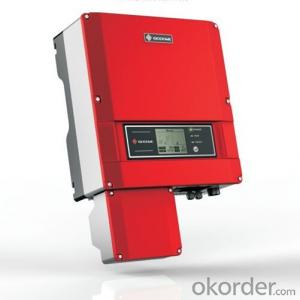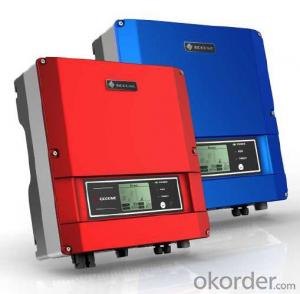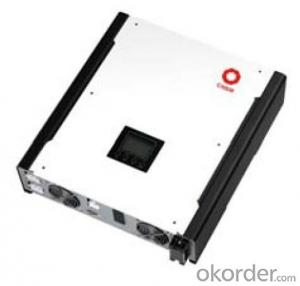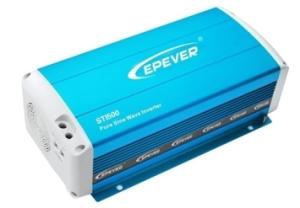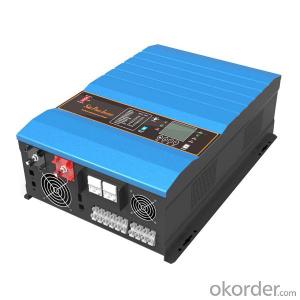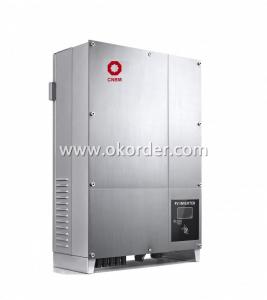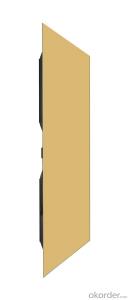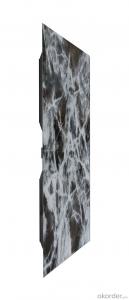On grid solar inverter GW3000D-DI (High Frequency Isolated)
OKorder Service Pledge
OKorder Financial Service
You Might Also Like
GW3000/3600/4200D-DI (High Frequency Isolated) is the new on-grid PV inverter which integrated with most advanced technology, come with 10 years warranty,
and are designed to meet the new IEE1547 requirements for the North American market. Also it’s suitable for thick-film modules.
Easy installation and simple operation make them ideal for residential and small-to-medium commercial applications.
GoodWe inverters, with ever-increasing efficiency and high stability,
could ensure you better overall performance of solar power systems and shorter payback periods.
Datasheet
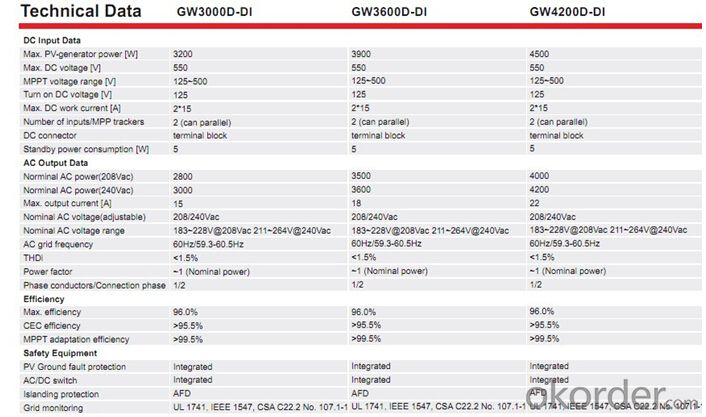
- Q:Can a solar inverter be used with a solar-powered telecommunications system?
- Yes, a solar inverter can be used with a solar-powered telecommunications system. A solar inverter is responsible for converting the direct current (DC) generated by solar panels into alternating current (AC) that can be used to power electrical devices. In the case of a solar-powered telecommunications system, the solar inverter would convert the DC power generated by the solar panels into AC power to effectively operate the telecommunication equipment.
- Q:Can a solar inverter be installed in a residential area?
- Yes, a solar inverter can be installed in a residential area. In fact, residential areas are one of the most common locations for solar power installations, including solar inverters. These inverters help convert the DC electricity generated by solar panels into AC electricity that can be used to power homes and other electrical devices.
- Q:Can a solar inverter be used with different types of energy management systems?
- Yes, a solar inverter can be used with different types of energy management systems. Solar inverters are designed to convert the direct current (DC) generated by solar panels into alternating current (AC) that can be used to power various electrical devices. They are compatible with different energy management systems, including grid-tied systems, off-grid systems, and hybrid systems. The inverter's main function is to ensure the efficient and safe conversion of solar energy, regardless of the type of energy management system it is paired with.
- Q:What is the difference between a PV grid-connected inverter and an off-grid inverter?
- Off-grid inverter is equivalent to their own to establish an independent small power grid, mainly to control their own voltage, is a voltage source.
- Q:Can a solar inverter be used in areas with limited roof space or installation options?
- Indeed, areas with limited roof space or installation options can still make use of a solar inverter. Typically, solar inverters are compact, enabling installation in diverse locations like the ground, walls, or even indoors. Moreover, there are various types of solar inverters accessible, such as microinverters and power optimizers, which offer greater flexibility in system design and installation. By utilizing these alternatives, available space can be maximized, and more installation options can be provided for areas with restricted roof space.
- Q:What is the difference between a string inverter and a micro inverter?
- A string inverter is a type of inverter that is connected to a string of solar panels, converting the DC power generated by the panels into AC power for use in the electrical grid. On the other hand, a micro inverter is a smaller and individual inverter that is attached to each solar panel, converting the DC power directly at the panel level. The main difference between the two is that a string inverter operates at the string level, which means if one panel in the string is affected by shade or malfunction, the entire string's performance is affected. In contrast, with micro inverters, each panel operates independently, allowing for higher energy production and better performance in situations where panels are subjected to shading or varying conditions.
- Q:How does a solar inverter affect the overall system cost?
- A solar inverter can increase the overall system cost as it is a crucial component responsible for converting the DC electricity generated by solar panels into AC electricity for use in homes and businesses. The efficiency, capacity, and quality of the inverter can influence the system's performance and reliability. Higher-quality inverters with advanced features tend to be more expensive, but they can maximize energy production and improve system durability, potentially offsetting the initial cost through increased energy savings over time.
- Q:How does a solar inverter affect the overall aesthetics of a solar installation?
- A solar inverter does not directly impact the aesthetics of a solar installation as it is typically installed indoors or in an inconspicuous location. However, a well-designed solar inverter system can contribute to a cleaner and more organized appearance of the overall solar installation by reducing the need for visible wiring and ensuring efficient energy conversion.
- Q:What are the potential risks of fire or explosions from a faulty solar inverter?
- The potential risks of fire or explosions from a faulty solar inverter include short circuits, electrical arcing, overheating, and component failure. These issues can lead to an accumulation of heat, sparks, or electrical discharges, which may ignite flammable materials nearby or cause an explosion. It is crucial to regularly inspect and maintain solar inverters to mitigate these risks and ensure the safe operation of the system.
- Q:Can a solar inverter be used in regions with high altitude conditions?
- Yes, a solar inverter can be used in regions with high altitude conditions. However, it is important to consider certain factors such as temperature variations, reduced air density, and increased UV radiation at higher altitudes. In such cases, it may be necessary to choose a solar inverter specifically designed to handle these conditions and ensure proper functioning and efficiency of the system.
1. Manufacturer Overview |
|
|---|---|
| Location | |
| Year Established | |
| Annual Output Value | |
| Main Markets | |
| Company Certifications | |
2. Manufacturer Certificates |
|
|---|---|
| a) Certification Name | |
| Range | |
| Reference | |
| Validity Period | |
3. Manufacturer Capability |
|
|---|---|
| a)Trade Capacity | |
| Nearest Port | |
| Export Percentage | |
| No.of Employees in Trade Department | |
| Language Spoken: | |
| b)Factory Information | |
| Factory Size: | |
| No. of Production Lines | |
| Contract Manufacturing | |
| Product Price Range | |
Send your message to us
On grid solar inverter GW3000D-DI (High Frequency Isolated)
OKorder Service Pledge
OKorder Financial Service
Similar products
New products
Hot products
Hot Searches
Related keywords
